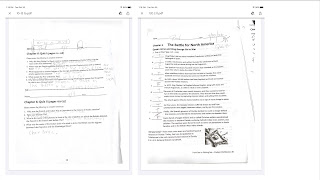While a veteran teacher, this month marks four years home-schooling for us. My friend teaches in Alaska and asked me to home-school her stepdaughter, Lacie. Gladly. My husband and I home-schooled our grandson during COVID and last year we helped with Lacie’s sister, Mary’s schooling. Mostly, my husband, Rob, and I work with Co-op, review portfolios, and tutor friends and neighbors. But, we’ve learned a few lessons.
1. Keep a digital record. Create a digital portfolio. (See below.) I started keeping records I. A slideshow for Lacie and Paul. Lacie kept her own records her senior year, which I reviewed and edited. When I home-schooled Paul, I took photos and scanned work samples every week. Lacie saves work, scans, and assembles the slideshow to submit to an online school at the end of the semester. Show labs, work samples, labs, projects, tests, field studies, dioramas, etc.
2. Work hard all morning. Get up, eat breakfast, and start Math. It’s a win when your kid tells you, ‘Well, I might as well get started.’ Have a daily core: English, Math, History, Faith, Science. Make a plan for extras. Paul did a week’s worth of Geography every Monday. He did short Faith lessons daily and had a weekly appointment with our son, a priest. We did the same thing this past semester with Mary. She completed a week’s worth of Faith lesson before her weekly meeting with Fr. Josh. We mixed up English lessons. We had daily reading writing assignments. We did Grammar or Vocabulary twice a week. We scheduled longer labs for the afternoon.
3. Evaluate your goals. Is it reasonable to finish the entire textbook? Mary and Paul both liked Geography and managed to complete their workbooks without any fuss. I tutor a young friend, Jacob, in Latin. We aren’t concerned about any timeline for completion and are working our way through the textbook a lesson or two each week. Paul is strong in Math. Rob and I knew he could finish the textbook in one year and schedules tests and quizzes accordingly, despite the textbook being a bit advanced. Mary became overwhelmed with a literature program. We scaled back the number of questions; this made for a better fit.
4. Prioritize the fundamentals: Math, English, History, Faith, and Science. There are always activities and events competing with school. Carve out mornings from 9-noon for school. When all of the work assigned is finished and checked, school is over for the day—except for Reading. Read after lunch for a half-hour. (It’s not cheating to listen to an audio book as a family after lunch instead.)
5. Use incentives liberally. I did reading notes, and quizzes in Science most days, with a fun experiment on Friday afternoons. We did any number of candy experiments! Check out the Incredible Edible Aquifer, Paul’s favorite. I’ve offered puzzles as incentives to finish hard novels. A visit to the pool, especially with friends, is always a top incentive—particularly if you teach year round. If your child loathes Grammar, add a bit to lessons Monday to Thursday, and let her off the hook on Fridays. The library may have incentives, too. Our local system has a Badge program. Would your child like to learn how to use a 3D printer? Make the badge an incentive. Does your Co-op have fun clubs or field trips? Make them incentives to complete the week’s lessons.
Most of what Rob and I have learned is to be flexible while maintaining
high, yet realistic goals. It’s always a balance. Every child is different. BTW you can do this!















No comments:
Post a Comment